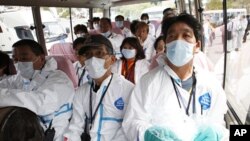In January, inspectors from the International Atomic Energy Agency trudged through the Japanese winter to visit the snow-bound Ohi nuclear power plant and approve a stress test carried out in the wake of the Fukushima meltdown.
But today its reactors remain dormant.
In fact, all but three of the country’s 54 reactors were shut down in the wake of the world’s worst nuclear disaster since Chernobyl, and polls suggest a majority of Japanese citizens don’t want them restarted.
Public skepticism on the rise
While not a legal requirement, Japanese custom dictates that approval from local authorities -- a thing that is currently far from certain -- would be needed before restarting the reactors, and in recent months, anti-nuclear protests have only gathered strength.
Kazuko Watanabe, standing among a group of Tokyo demonstrators, says she doesn't understand why Japan must continue to rely on nuclear power.
"Nuclear waste takes hundreds of thousands of years to break down," she says. "I have no trust in the politicians who have vowed to protect the people, the children and our hometowns."
Ever since two government advisory panel experts claimed lessons were not learned from the Fukushima Dai-ichi Nuclear Power Plant disaster, public skepticism has grown. Stress tests on Japan’s other reactors, the experts said, simulated only one natural disaster at a time, which ignored the possibility of a joint earthquake and tsunami -- as happened last year -- and also excluded equipment failure and human error.
"Members of the IAEA left Japan without investigating and conducting research themselves," says Hiromitsu Ino of Tokyo University, one of the two government panel experts.
IAEA inspections, he says, are just for show.
"My impression at the time was that the Japanese government just wanted an endorsement of the work of the Japanese energy companies."
Everything uprooted
Before the Fukushima crisis, Japan got a third of its energy needs from atomic power.
"Nuclear power was supposed to be that answer to their problems," says Paul Scalise, an energy expert at Tokyo University. "With the nuclear crisis at Fukushima, everything now has been uprooted, and it’s very unclear if renewable energy with its very high price-per-kilowatt-hour -- and the general level of instability that renewables currently create -- prevent a very smooth transfer from nuclear to renewables like solar, wind, etcetera."
Because Japan lies on very active seismic fault lines, Scalise says volcanoes and hot springs offer huge potential for geothermal power, where steam generated from underground heat is used to drive turbines.
"Geothermal is a fantastic base-load energy source," he says. "It is clean, it is relatively inexpensive, and it is abundant. Unfortunately it has political problems. Most of the best sites are located in Japan’s national parks."
In a few months, stifling summer heat will create booming demand for power, which, analysts say, leaves Japan facing a stark choice: restart the reactors or begin investing in a long and expensive switch to alternative energy.




